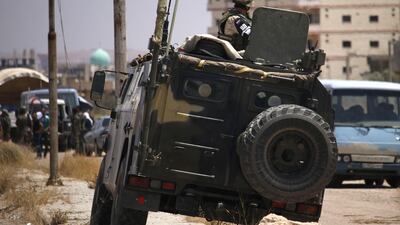After years of distancing itself from a group of military contractors doing its bidding in Syria, the Kremlin is facing renewed pressure to recognise the covert forces’ existence. But unlike previous demands to acknowledge the mercenaries, this time it is Russia’s own military establishment urging authorities to come clean.
Earlier this month, a group of Russian military leaders released a joint statement addressed to President Vladimir Putin and the country’s supreme court arguing that the mercenaries should be recognised by the government so they have access to proper medical and financial support after they return from the battlefield.
"For three years already, we have been receiving complaints and appeals from Russian citizens who were injured in Syria and cannot undergo medical treatment in Russia," read the statement, which was signed by retired Colonel-General Leonid Ivashov, retired Colonel Vladimir Petrov and Yevgeni Shabayev, a Cossack leader.
"Soldiers and officers of these combat units have no social, medical or financial support from the state ... We demand that the status of combat participants in private military companies be recognised."
Vladimir Putin entered the Syrian war in September 2015 in an effort to buttress the struggling forces of Syrian president Bashar Al Assad. The Kremlin’s intervention and its ongoing campaign of airstrikes are credited with turning the tide of the conflict in favour of the besieged Syrian president.
After two costly military interventions in Chechnya and Afghanistan, however, the Russia public is sensitive to wars in which thousands of Russian military personnel return home in metal caskets. In an effort to minimise its footprint in Syria, the Kremlin has leaned on mercenaries, which are illegal under Russian law, and a small detachment of special forces, mainly from the North Caucasus republic of Chechnya.
______________
Read More:
Syrian regime advances in south as Russia downs two attack drones
Russia to talk Syrian refugee return plan in Beirut
Russian helicopter crashes in Syria, killing both pilots
______________
The mercenary Wagner Group, named after the nom de guerre of its founder Dmitry Utkin, is believed to have been active in Syria since 2013. Its reported funder, a Kremlin-linked business man named Yevgeny Prigozhin was added to a US treasury sanctions list for his business dealings with Russia’s Defense Ministry.
Despite the Kremlin’s best efforts to keep the group’s operations under wraps, however, the fighters have found themselves in the war’s spotlight.
In February this year, a botched mission to capture an oil field in northern Syria under control of US-allied forces drew attention to the fighters, their role in the conflict and their links to the Kremlin.
Around 300 mercenaries fighting alongside pro-Assad forces are estimated to have been wounded or killed near Deir Ezzor after US airstrikes pounded the advancing forces for upwards of three hours.
The embarrassing incident shows why the Russian government may be reticent to give the private military groups legal status says Alexey Khlebnikov, a Middle East analyst at the Russian International Affairs Council, which is close to the Foreign Ministry.
"For one, the Defense Ministry does not want to lose the monopoly on Russia's use of military force," Khlebnikov told The National. "The case of mercenaries being bombed in Syria raised concerns about the level of their professionalism and ability to cooperate with the ministry."
The failed operation, and this lack of cooperation more specifically, also highlights how the aims of private mercenary groups have diverged from the Russian government’s objectives since the beginning of its intervention in Syria — yet another reason why recognising or legalising mercenaries could prove problematic for Moscow.
In December, the Associated Press reported that the Syrian state oil company had offered the mercenary groups 25 per cent of profits from oil fields they liberated from ISIS. However, this contract is precisely the kind of mission that could undermine the contractors’ chances of receiving state help on returning to Russia, says Mr Khlebnikov.
“In Syria, [the Russian] Defense Ministry finds it problematic when private mercenary companies act in their own or Syrian state interests without consulting with them,” he said. “It puts the ministry’s own calculations and plans in the country at risk.”
Much like the number of formal Russian servicemen in Syria, how many Russian mercenaries have participated in the seven-year conflict is unclear. A Reuters investigation this year citing paramilitary leaders in Russia estimated the numbers between 2,000 and 3,000.
Likewise the numbers of their deaths have been difficult to track. Reuters tallied 40 deaths between January and August in 2017 alone.
Then the public reporting on the hundreds of casualties suffered during the botched oil field raid in February left Moscow scrambling for an explanation, amid Kremlin concerns of a public outcry that could have forced the government’s hand on the issue.
“Definitely the incident in February put Kremlin in the very uncomfortable situation,” says Mr Khlebnikov. “On one hand, people were concerned that the Russians were left without help and assistance in the country. On the other hand, the public is concerned that someone except the army might have a say in the conflicts.”
President Putin made a surprise visit to Russia’s airbase in Syria in December to declare mission complete and announce a drawdown in Russian troops. Despite appearances though it hasn’t signalled the end the Russia’s Syria intervention. In early June, Russian media reported a new group called Patriot is now active in Syria.
The ongoing role of Russian mercenaries in Syria is unlikely to bring about a change in their legal status back home though, analysts predict.
“It’s important to remember that military veterans are those who served in the military and were sent to war,” said Michael Kofman, an expert on Russia at the Center for Naval Analysis. “These are mercenaries to whom the state does not necessarily owe any obligation, and who signed a commercial contract to deploy into a conflict zone.”

